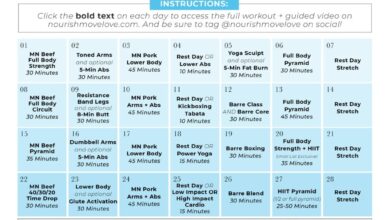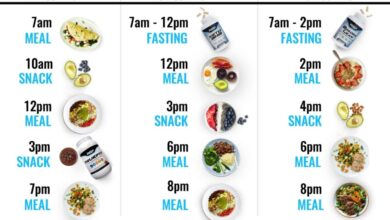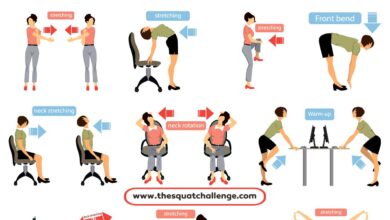
Get Back on Track with Weight Loss: Simple Strategies
Ways to get back on track with weight loss – We’ve all been there: the weight loss journey starts strong, but life throws curveballs, and we find ourselves slipping back into old habits. “Get Back on Track with Weight Loss: Simple Strategies” isn’t about starting over; it’s about recognizing those roadblocks and finding a path back to your goals.
This isn’t about deprivation or extreme measures, but about building sustainable habits that fit your lifestyle.
Think of this as a gentle nudge, a reminder that you have the power to regain control and achieve your weight loss goals. We’ll explore how to reassess your goals, address potential roadblocks, reconnect with healthy habits, and find support to stay motivated.
Ready to get back on track? Let’s dive in.
Reassessing Your Goals and Strategies: Ways To Get Back On Track With Weight Loss
It’s easy to get caught up in the initial excitement of starting a weight loss journey. But, as time goes on, it’s crucial to reassess your goals and strategies to ensure they remain effective and aligned with your progress. Regularly reviewing your plan can help you stay motivated, make necessary adjustments, and ultimately achieve your desired results.
Getting back on track with weight loss can feel overwhelming, but it doesn’t have to be! One key aspect is learning to cook healthy meals at home. Mastering essential cooking skills empowers you to create delicious and nutritious dishes that fit your dietary needs.
This allows you to control portion sizes, experiment with fresh ingredients, and avoid processed foods that can sabotage your weight loss goals.
Identifying Areas for Improvement
To determine if your current weight loss strategy needs a refresh, consider these key areas:
- Goal Realist: Are your weight loss goals realistic and achievable? It’s important to set goals that are challenging yet attainable. Aiming to lose too much weight too quickly can lead to frustration and setbacks.
- Lifestyle Changes: Have you made sustainable lifestyle changes that you can maintain long-term?
Weight loss is not a temporary fix, it’s about adopting healthy habits that you can incorporate into your everyday life.
- Diet and Exercise: Are your current diet and exercise plans working for you? If you’re not seeing results, it might be time to explore alternative options.
- Emotional Eating: Are you using food as a coping mechanism for stress, boredom, or other emotions? Identifying and addressing emotional eating patterns is crucial for successful weight loss.
- Support System: Do you have a strong support system in place? Surrounding yourself with people who encourage and motivate you can make a significant difference in your weight loss journey.
Resetting Your Mindset
When you realize your weight loss strategy needs a revamp, it’s time to reset your mindset and approach the process with a fresh perspective. Here’s how:
- Focus on Progress, Not Perfection: Celebrate your successes, no matter how small they may seem. Weight loss is a journey, and there will be ups and downs along the way. Don’t let setbacks derail your progress.
- Practice Self-Compassion: Be kind to yourself. It’s okay to make mistakes, and it’s important to learn from them and move forward.
- Reframe Challenges as Opportunities: View obstacles as chances to learn and grow. Instead of getting discouraged, consider how you can adapt your strategy to overcome the challenge.
- Set Small, Achievable Goals: Break down your overall weight loss goal into smaller, more manageable milestones. This will help you stay motivated and track your progress.
- Seek Professional Guidance: If you’re struggling to make progress on your own, consider seeking professional help from a registered dietitian, certified personal trainer, or therapist.
Addressing Potential Roadblocks

It’s normal to encounter obstacles on your weight loss journey. Everyone experiences setbacks, and it’s crucial to acknowledge and address them to maintain momentum. Identifying common roadblocks and developing strategies to overcome them can help you stay on track and achieve your goals.
Getting back on track with weight loss can feel overwhelming, but remember it’s a journey, not a race. One of the biggest hurdles is finding the time to cook healthy meals, but there’s a solution! Check out these diets and recipes for 35 minute dinners , they’re quick and delicious, making healthy eating achievable even with a busy schedule.
With a little planning and these tasty recipes, you’ll be back on track in no time.
Common Roadblocks and Strategies
Understanding why people struggle to maintain their weight loss efforts is essential. Here are some common reasons and practical strategies to overcome them:
Stress
Stress can significantly impact weight loss. When stressed, your body releases cortisol, a hormone that can increase appetite and promote fat storage. It can also lead to emotional eating and unhealthy coping mechanisms.
- Practice stress-reducing techniques:Engaging in activities like yoga, meditation, or deep breathing exercises can help manage stress levels and reduce cortisol production.
- Prioritize sleep:Adequate sleep is crucial for managing stress and regulating hormones that control appetite. Aim for 7-8 hours of quality sleep each night.
- Seek support:Talking to a therapist or joining a support group can provide emotional support and coping strategies for managing stress.
Lack of Support
Having a strong support system can significantly impact weight loss success. Lack of support can lead to feelings of isolation, making it challenging to stay motivated and accountable.
- Join a support group:Connecting with others who are on a similar journey can provide encouragement, motivation, and a sense of community.
- Seek support from family and friends:Involve loved ones in your weight loss journey by sharing your goals and asking for their support and understanding.
- Consider working with a coach:A weight loss coach can provide personalized guidance, accountability, and motivation throughout your journey.
Unrealistic Expectations
Setting unrealistic weight loss goals can lead to frustration and disappointment. It’s important to set achievable targets and celebrate small victories along the way.
- Focus on sustainable changes:Aim for gradual, sustainable changes to your lifestyle rather than drastic measures that are difficult to maintain.
- Set realistic goals:Consult with a healthcare professional to determine a safe and achievable weight loss rate.
- Celebrate progress:Acknowledge and reward yourself for reaching milestones, no matter how small, to maintain motivation.
Reconnecting with Healthy Habits
Getting back on track with weight loss often involves revisiting and reinforcing healthy habits. It’s about creating a sustainable lifestyle that supports your weight loss goals. This section explores strategies for reconnecting with healthy eating and exercise routines.
Creating a Consistent Routine
Establishing a consistent routine is crucial for weight loss success. It helps to build healthy habits and makes it easier to stick to your goals.
- Set realistic goals:Don’t try to change everything at once. Start with small, achievable goals and gradually increase the intensity and duration of your workouts and the healthy changes you make to your diet.
- Schedule time for exercise:Treat exercise as a non-negotiable appointment. Block out time in your schedule, just like you would for work or other commitments.
- Make healthy eating a priority:Plan your meals ahead of time, prepare healthy snacks, and make time for grocery shopping to ensure you have nutritious food readily available.
- Find an accountability partner:Having someone to support you can make a big difference. Join a fitness class, work out with a friend, or find an online community that shares your weight loss goals.
Creating a Meal Plan
A well-structured meal plan is essential for weight loss. It helps you make healthy food choices and ensures you’re getting the nutrients your body needs.
- Identify your dietary needs and preferences:Consider any food allergies, intolerances, or dietary restrictions. Think about the foods you enjoy eating and those you find easy to prepare.
- Focus on nutrient-dense foods:Include plenty of fruits, vegetables, lean protein, and whole grains in your diet. These foods provide essential vitamins, minerals, and fiber to keep you feeling full and satisfied.
- Limit processed foods, sugary drinks, and unhealthy fats:These foods can contribute to weight gain and other health problems. Choose whole, unprocessed foods whenever possible.
- Plan for meal prepping:Prepare healthy meals and snacks in advance to avoid relying on takeout or unhealthy options when you’re short on time.
Designing a Weekly Workout Schedule
A well-rounded workout routine should incorporate different types of exercise to challenge your body and prevent plateaus.
- Cardiovascular exercise:This type of exercise elevates your heart rate and helps to burn calories. Examples include running, swimming, cycling, and dancing.
- Strength training:Strength training builds muscle mass, which helps to boost your metabolism and burn more calories even at rest. Include exercises that target all major muscle groups, such as squats, lunges, push-ups, and rows.
- Flexibility and mobility exercises:These exercises help to improve your range of motion, reduce muscle soreness, and prevent injuries. Examples include yoga, Pilates, and stretching.
A sample weekly workout schedule might include:
| Day | Workout | Duration |
|---|---|---|
| Monday | Cardio (running, swimming, cycling) | 30-45 minutes |
| Tuesday | Strength training (upper body) | 30-45 minutes |
| Wednesday | Rest or light activity (yoga, walking) | |
| Thursday | Strength training (lower body) | 30-45 minutes |
| Friday | Cardio (high-intensity interval training, dance) | 30-45 minutes |
| Saturday | Rest or active recovery (hiking, swimming) | |
| Sunday | Rest or light activity (yoga, stretching) |
Finding Support and Accountability
The journey back to your weight loss goals can be challenging, but it doesn’t have to be a solo mission. Seeking support and establishing accountability can make a world of difference in your success.
Sometimes getting back on track with weight loss can feel overwhelming, but it’s all about making small, sustainable changes. One easy swap that’s both delicious and nutritious is replacing creamy mashed potatoes with a healthier version like slow cooker vegan mashed sweet potatoes.
This recipe is packed with fiber and vitamins, keeping you feeling full and satisfied while supporting your weight loss goals. Remember, consistency is key, so focus on incorporating healthy choices like this one into your routine.
Benefits of Seeking Support
Surrounding yourself with a supportive network can significantly enhance your weight loss journey.
- Emotional Support:Weight loss can be emotionally taxing, and having a support system can provide encouragement, understanding, and a listening ear during challenging moments.
- Motivation and Inspiration:Friends, family, or even online communities can offer motivation and inspiration, reminding you of your goals and celebrating your milestones.
- Accountability:Knowing that others are aware of your goals can create a sense of accountability, encouraging you to stay on track and avoid slipping back into old habits.
- Practical Assistance:Support can be practical, too. Friends or family members can help with meal preparation, grocery shopping, or even join you for exercise sessions, making healthy choices easier.
Accountability Partners
An accountability partner is someone who is committed to helping you stay on track with your weight loss goals.
- Shared Goals:Finding a partner with similar goals can create a sense of camaraderie and shared responsibility, making it more likely that you’ll both achieve your targets.
- Regular Check-ins:Schedule regular check-ins with your partner to discuss progress, challenges, and strategies. These conversations can keep you accountable and motivated.
- Support and Encouragement:An accountability partner can provide support and encouragement when you’re feeling discouraged or tempted to give up.
- Celebrating Successes:Share your successes with your partner and celebrate each milestone together. This positive reinforcement can boost your motivation and help you stay on track.
Connecting with Online Communities, Ways to get back on track with weight loss
The internet offers a wealth of resources and communities for individuals seeking support and connection on their weight loss journeys.
- Online Forums:Forums dedicated to weight loss provide a platform to connect with others who share similar goals, exchange tips, and offer encouragement.
- Social Media Groups:Facebook, Instagram, and other social media platforms have numerous groups dedicated to weight loss, where you can find support, motivation, and recipes.
- Weight Loss Apps:Many weight loss apps offer online communities where users can connect, share progress, and motivate each other.
Celebrating Progress and Maintaining Momentum
It’s easy to get caught up in the daily grind of weight loss, focusing solely on the end goal. But taking time to celebrate your progress along the way is crucial for maintaining motivation and staying on track. Recognizing your accomplishments, no matter how small, can be a powerful motivator to keep going.
Celebrating Small Victories
Celebrating your progress doesn’t have to be extravagant. It’s about acknowledging your efforts and rewarding yourself for your hard work. Here are some ideas for celebrating small victories:
- Mark your milestones: Set realistic goals, such as losing a certain amount of weight or fitting into a smaller size, and celebrate each achievement. This could involve a small treat, a relaxing activity, or simply taking a moment to appreciate your progress.
- Track your progress: Keeping a journal or using a fitness tracker can help you visualize your progress and identify areas where you’re making strides. This can be a great source of motivation and a reminder of how far you’ve come.
- Reward yourself: It’s important to reward yourself for your hard work, but choose rewards that align with your weight loss goals. This could be a new workout outfit, a healthy meal at your favorite restaurant, or a massage.
Staying Motivated and Avoiding Setbacks
Staying motivated on a weight loss journey can be challenging, especially when you encounter setbacks. Here are some strategies for staying on track:
- Focus on the positive: When you face challenges, remind yourself of your reasons for starting your weight loss journey and the progress you’ve already made. Focusing on the positive can help you stay motivated and avoid giving up.
- Find a support system: Surrounding yourself with supportive friends, family, or a weight loss group can provide encouragement and accountability. They can help you stay motivated and offer support during tough times.
- Be kind to yourself: Everyone makes mistakes, and it’s important to be forgiving of yourself when you slip up. Instead of dwelling on setbacks, learn from them and move forward.
Incorporating Sustainable Habits
To maintain your weight loss success long-term, it’s essential to incorporate sustainable habits into your lifestyle. This means making changes that you can maintain over time without feeling deprived or overwhelmed.
- Make gradual changes: Instead of trying to overhaul your entire lifestyle overnight, focus on making small, gradual changes that you can easily incorporate into your routine. This approach is more likely to lead to long-term success.
- Find activities you enjoy: Exercise should be something you look forward to, not a chore. Explore different activities until you find ones that you enjoy and that fit your lifestyle.
- Focus on healthy eating habits: Instead of restrictive diets, focus on making healthy choices that you can sustain over time. This includes eating whole, unprocessed foods, drinking plenty of water, and limiting processed foods and sugary drinks.
Final Review
Remember, weight loss is a journey, not a race. There will be ups and downs, but with a clear strategy, a supportive network, and a commitment to yourself, you can achieve lasting success. Don’t be afraid to celebrate your progress, acknowledge setbacks as learning opportunities, and keep moving forward.
You are capable of reaching your goals, one step at a time.






